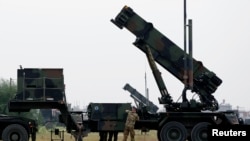ANKARA —
The United States is talking to Turkey about its concerns regarding Ankara's decision to co-produce a long-range air and missile defense system with a Chinese firm that is currently under U.S. sanctions, U.S. Ambassador Francis Ricciardone said on Thursday.
“We are very concerned about the prospective deal with the sanctioned Chinese firm. Yes, this is a commercial decision, it is Turkey's sovereign right, but we are concerned about what it means for allied air defense,” Ricciardone told reporters.
Turkey, a member of the NATO military alliance, announced in September it had chosen the FD-2000 missile defense system from China Precision Machinery Import and Export Corp, or CPMIEC, over rival systems from Russian, U.S. and European firms.
CPMIEC is under U.S. sanctions for violations of the Iran, North Korea and Syria Nonproliferation Act.
“We have just begun expert discussions with Turkey and it will be done through official channels. We will have respectful conversations. We are concerned, but Turkey will make its own decision after examining the facts,” Ricciardone said.
Turkey has said it is likely to sign the $3.4 billion missile defense deal with CPMIEC but that its decision is not yet final. Some defense analysts had expected the contract to go to U.S. company Raytheon Co or Franco-Italian firm Eurosam SAMP/T.
Diplomats say buying a system that does not work with NATO systems would hamper the ability of NATO allies to work together, undermining a principle of the 28-nation alliance.
“We are very concerned about the prospective deal with the sanctioned Chinese firm. Yes, this is a commercial decision, it is Turkey's sovereign right, but we are concerned about what it means for allied air defense,” Ricciardone told reporters.
Turkey, a member of the NATO military alliance, announced in September it had chosen the FD-2000 missile defense system from China Precision Machinery Import and Export Corp, or CPMIEC, over rival systems from Russian, U.S. and European firms.
CPMIEC is under U.S. sanctions for violations of the Iran, North Korea and Syria Nonproliferation Act.
“We have just begun expert discussions with Turkey and it will be done through official channels. We will have respectful conversations. We are concerned, but Turkey will make its own decision after examining the facts,” Ricciardone said.
Turkey has said it is likely to sign the $3.4 billion missile defense deal with CPMIEC but that its decision is not yet final. Some defense analysts had expected the contract to go to U.S. company Raytheon Co or Franco-Italian firm Eurosam SAMP/T.
Diplomats say buying a system that does not work with NATO systems would hamper the ability of NATO allies to work together, undermining a principle of the 28-nation alliance.




